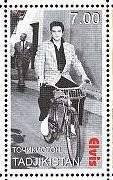
Artist: Dexter Gordon
Album: Gettin’Around (1965)
Dexter Gordon's "Gettin' Around" may not be universally celebrated but it is great to have it available once again via this RVG Edition. Personally, I find it to be highly enjoyable. I agree that this is not his best effort on Blue Note, but his eight albums for the label are the crowning achievement of his five decade long career. Like most of his Blue Notes, "Gettin' Around" was recorded during a stateside tour (like many jazz musicians in the 60s, Gordon chose
Original Liner Notes:
-Ira Gitler
Since 1962 Dexter Gordon has been living in
At the end of 1964 Gordon visited the
Side 1 is made up of two fairly recent popular songs and one tune that goes back quite a bit farther. Gordon's version of Luis Bonfa's Manha de Carnaval (Morning of the Carnival) from Black Orpheus is a bit slower than this bossa nova is usually played. Dex's sensual, expansive sound and languorous delivery immediately create a cloud to sink into and float on. Talk about being relaxed.
Gordon caresses Anthony Newley's Whoe Can I Turn To (not to be confused with Alec Wilder's song of the same title) as if he is holding a beautiful woman in his arms. His interplay with Hutcherson after Bobby picks up the melody statement is particularly moving.
On the old hit Ted Weems made famous, Heartaches, Dexter demonstrates how a great professional can insinuate a whole feeling just in the way he states the melody. He prepares you in definite but subtle ways for the harder swinging that is to come. The tempo is not that fast but Gordon can generate power at any speed. Huchterson, showing his earlier Milt Jackson influence, and Harris have short but sweet solos before Dex returns with a clever quasi-quote from Deep In The Heart Of Texas - he has wit to match his heart - and brings everything to a climax with a dancing, delayed ending. Where Elmo Tanner whistled with Weems, Gordon wails with urbane heat.
Side 2 opens with an original by another fine contemporary tenor saxophonist, Frank Foster. While he was a member of the Count Basie orchestra Foster wrote Shiny Stockings and it has become a favorite of many modern musicians. (Pianist Jaki Byard uses it as his theme song.) The groove is an easy-swinging one here with Gordon, Hutcherson and Harris taking a chorus apiece, Dexter doing a reprise, and the out. There is absolutely no strain either in the playing or the listening.
Everybody's Somebody's Fool is a "blues ballad" popularized by the first name band that Gordon ever worked with - Lionel Hampton - although it was first recorded in 1949, several years after he had left Hamp. Gordon strikes a wistful, late-hour mood, again bringing his beautiful tone into full play. Harris contributes an appropriately dreamy interlude. When he returns, Dexter makes a reference to Don't Explain - perhaps by design, or by accident.
Dexter's only written contribution to the session is a light, bouncy line called Le Coiffeur (The Hairdresser). I wonder it he have someone specific in mind when he wrote this. To open his improvisation Gordon makes obvious but effective use of the written line and proceeds to employ rhythmic figures that echo the piece's structure. This adds a sense of unity to the whole track Hutcherson and Harris stay with the character that has been established.
I think it is evident that the supporting cast was with Dexter all the way in this album. He set the tone and they fell right in with him. Since he is an expatriate it is not often that the New York-based musicians receive a chance to play in his company. Gordon's charm and musical inspiration make his company both delightful and stimulating. With albums such as this Santa Dex is able to disseminate his Christmas messages all year long.





No comments:
Post a Comment